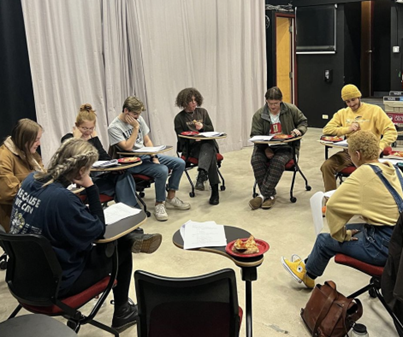
Not all concept albums are created equal. Some, like Pink Floyd’s Animals or Nine Inch Nails’ Year Zero, boldly state their purposes with blunt song titles, specific imagery, or (as in the more recent example) an accompanying viral marketing campaign, complete with an array of websites ostensibly taken from the world wide web of a dystopian future. Then there are more subtle concept affairs, such as OK Go’s Of the Blue Colour of the Sky or Arcade Fire’s Funeral, with songs that might revolve around an underlying theme but hardly wear it on their sleeves.
Cold War Kids’ fourth record, Dear Miss Lonelyhearts, is of the second variety. Though it directly lifts its title from a 1933 novel about an advice columnist trying to find redemption within his own life, you’d be hard-pressed to hear one single thread unifying the record. In actuality, Lonelyhearts is really just a ten-track collection of songs about a guy struggling with alcohol, drugs, love, loneliness and self-loathing, or what is otherwise known as every indie rock album written by a male lead, ever.
That being said, Lonelyhearts is without a doubt the most cohesive record Cold War Kids have put out to date. While the Kids have always had a unique knack for crafting concise and addictive bluesy indie-rock jams, they’ve generally struggled in the long form. Lonelyhearts seems to be an attempt to counter that, focusing less on hooks and more on constructing an overarching mood. Generally, it feels like a logical and natural combination of the more bluesy tone of the group’s early releases and the anthemic nature of its last record Mine Is Yours. But while Lonelyhearts might just be the most consistent Cold War Kids record yet, it’s also by far the group’s least memorable.
The record starts strong, with a driving, piano-led rock gem called “Miracle Mile.” The keys delightfully pound along, the guitar croaks warmly, and the drums inject the track with a propulsive energy. But the real star is Nathan Willet, with a fantastically nimble vocal performance that shows him simultaneously looking forward and looking back. “I was supposed to do great things, I knew the road was long,” he opens reflectively, eventually giving way to a soaring chorus in which he spouts: “I’ll be alright, if I could just see you/Miracle mile, where does it lead to?” It’s a near-perfect three minutes. It’s also hands-down the best track on the album.
This isn’t to say there aren’t other strong tracks on Lonelyhearts. Second track “Lost That Easy” manages to turn a frantically busy drum beat into a solid, head-nod-worthy groove with a thumping chorus that sticks pretty firmly. “Bottled Affection” provides a nice bit of mid-album bounce (is that autotune I hear?) that’s a bit reminiscent of The Temper Trap’s fantastic last record. And “Jailbirds” recalls some of the Cold War Kids’ first album glory, with a prominent piano part and some evocative lyrics in the chorus: “Father, make believe for your daughters/Mother, take it easy on your sons/You’ve got to keep them young.” Willet’s performances on these tracks can’t be denied, but just as importantly, he also has the wisdom to give his instrumentalists their moments in the spotlight.
The problem is, Willet just doesn’t shut up quite enough. For every charming inflection or clever line he spits out, there’s also a moment in which he’ll immediately overwhelm an intriguing synth part or catchy bass riff with a piercing vocal line. For instance, the album’s closer, “Bitter Poem,” opens with a soft bell chime that immediately makes you hope for something more understated to close out the record. A few seconds later, Willet’s voice cuts through the mix like a firecracker and completely undermines any suspense that may have existed. It’s not a bad song, but you can’t help but wish Cold War Kids had taken it in a subtler, more instrumentally focused direction. And when these moments stack-up over Lonelyhearts’ 40-ish minutes, Willet’s distinct tenor becomes less a unique trill and more an aggravating warble.
There’s also a deflating sense of drabness on some of the record’s slower tracks, of which there are several. When the tempos drop and the guitars drag, Cold War Kids (or really, Nathan Willet) just doesn’t seem to be having much all that much fun. And thematically, the record is almost entirely on the negative side – though the album supposedly draws its concept from a tale of redemption, there’s little of that to be found.
Now, this might be an unfair criticism. Cold War Kids have always been a band with songs primarily about conflict and the difficulties of human existence. But at least when Willet was singing about Old Saint John on death row, you got the sense he was being a little tongue-in-cheek, or at least self-aware. Now, he seems to be taking himself too seriously, and no matter how grand the album’s scale may be, it’s ultimately a disconnecting and disappointing listen.











